INTRODUCTION
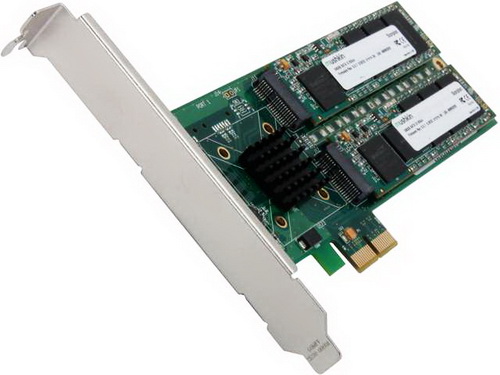
To this date largely thanks to the several price drops which have occurred over the course of the past 2 years more and more consumers choose to equip their systems with SATA III SSD models in order to experience superior read & write performance compared to regular mechanical drives. However although for casual users, gamers, overclockers and most professionals the performance of SATA III SSDs is probably more than what they'll ever need the same doesn't apply for certain people (and companies) who place performance above all else. For such audiences several manufacturers started producing PCI-E based SSDs as far back as 7 years ago (if memory serves me well the first manufacturer to attempt this was Fusion-io with their io-Drive) but up until this day prices were not what most people would call affordable. Today with us we have one of the most cost-effective PCI-E SSDs in the market, the Scorpion 480GB by Mushkin.
For nearly 20 years, Mushkin has been dedicated to helping overclockers, gamers, IT managers, digital artists and mobile professionals enhance their computing experience by providing reliable, high-performance products. Mushkin products include a line of Flash Memory-based products and complete selection of memory upgrades for desktops, notebooks and servers. Since the company’s founding in 1994, Mushkin has received numerous awards and commendations for quality, reliability and technical excellence.
Compared to regular SATA SSD models PCI-E models use the extra firepower offered by your PCI Express slot which thanks to multi-lane scalability can reach speeds many times over those achieved by the well-established SATA III standard. Going back to the product at hand the Scorpion 480GB model which we have here with us today is basically two M.2 240GB SATA III SSDs (support both TRIM & NCQ) mounted onto a PCI-E 2.0 x2 card and configured in RAID0 mode with the help of the 88SE9230 Marvell RAID controller (this controller also supports RAID 0/1/10). The M.2 240GB SATA III SSDs feature two LSI SandForce SF-2281 controllers (one each) paired with 8 Micron 19nm MLC NAND flash memory modules. This combination allows the Scorpion 480GB PCI-E X2 SSD to achieve up to 100.000 4K read/write input/output operations per second (IOPS) and 925/800MB/s sequential read/write with an somewhat impressive MTBF of 1 million hours. These all look great on paper (although less great compared to the more x4/x8 high-end models) but the time has come to see how the Scorpion 480GB PCI-E X2 SSD by Mushkin does for real.
SPECIFICATIONS AND FEATURES

PACKAGING AND CONTENTS
The small box has a product picture at the front along with the main product features, company logo and a sticker with the capacity of the model inside.
Both the features and specifications lists are placed at the rear of the box right next to the bundle contents list which is printed in 5 languages.
The drive with its bundle is placed between two black thick pieces of foam.
A low profile PCI bracket and a quick start guide are shipped with the Scorpion drive.
THE SCORPION 480GB
With a length of 167.5mm, width of 12mm and height of 69mm the Scorpion is one of the smallest PCI-E drives we've seen to date.
As mentioned earlier the Scorpion 480GB consists out of two M.2 240GB SATA III drives.
These drives feature the rather old yet tested SandForce SF-2281 and 8 Micron 19nm MLC NAND flash modules each (32GB in size).
The Marvell 88SE9230 host controller is placed beneath a small black heatsink (supports on-the-fly AES 128/256-bit encryption, NCQ, AHCI interface and RAID 0/1/10).
With support for x2 slots this means that you can't plug the Scorpion into an X1 slot (and even if you could you shouldn't).

Aside a large sticker with the product name, serial name, capacity, barcode and type of PCIe the rear of the PCB is pretty much empty.
The Marvell host controller has its own bios which you can access at boot (ctrl+m). From the factory the Scorpion drive is configured in RAID0 but you can change it to RAID1 if you want (RAID10 is available however with models that have at least 4 M.2 drives on them).
TEST BED
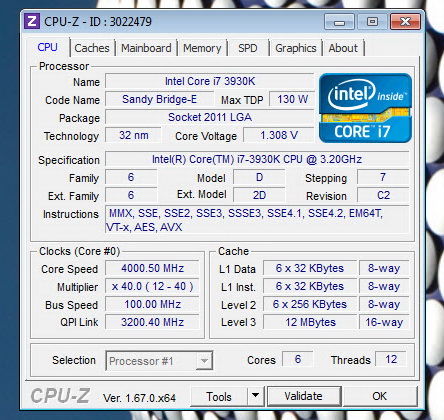

TESTING METHODOLOGY
After roughly 6 years of testing sold state drives i have concluded that it's almost impossible for any single benchmark suite to accurately measure their performance and that's why in certain benchmark suites we see amazing read/write performance numbers with some drives while in others things are quite different. The reason behind this is that some benchmarking suites are configured to read and write random chunks of data while others read and write constant (sequential) ones. So that's why i always use a very wide selection of benchmarking suites including AIDA64, HD Tach RW, HD Tune Pro, Crystal Disk Mark, Sisoftware Sandra Pro, AS SSD, IOmeter and ATTO. To get the most accurate results each test gets repeated a total of 6 times with the average performance numbers recorded into our charts.
Many people made inquiries about the charts ever since the last comparison so once again please do keep in mind that the Charts have the average performance numbers of each drive recorded and not the peak (highest) ones. Also although every single one of these programs can help potential buyers choose the right drive for their needs you should also remember that from any kind of benchmark up to real world usage the gap is not small (and usually most differences will go unnoticed by most people). All tests were performed in a fresh Windows 7 Ultimate x64 installation with every update installed up to November 25th 2014.
TEST RESULTS - AIDA64 / ATTO
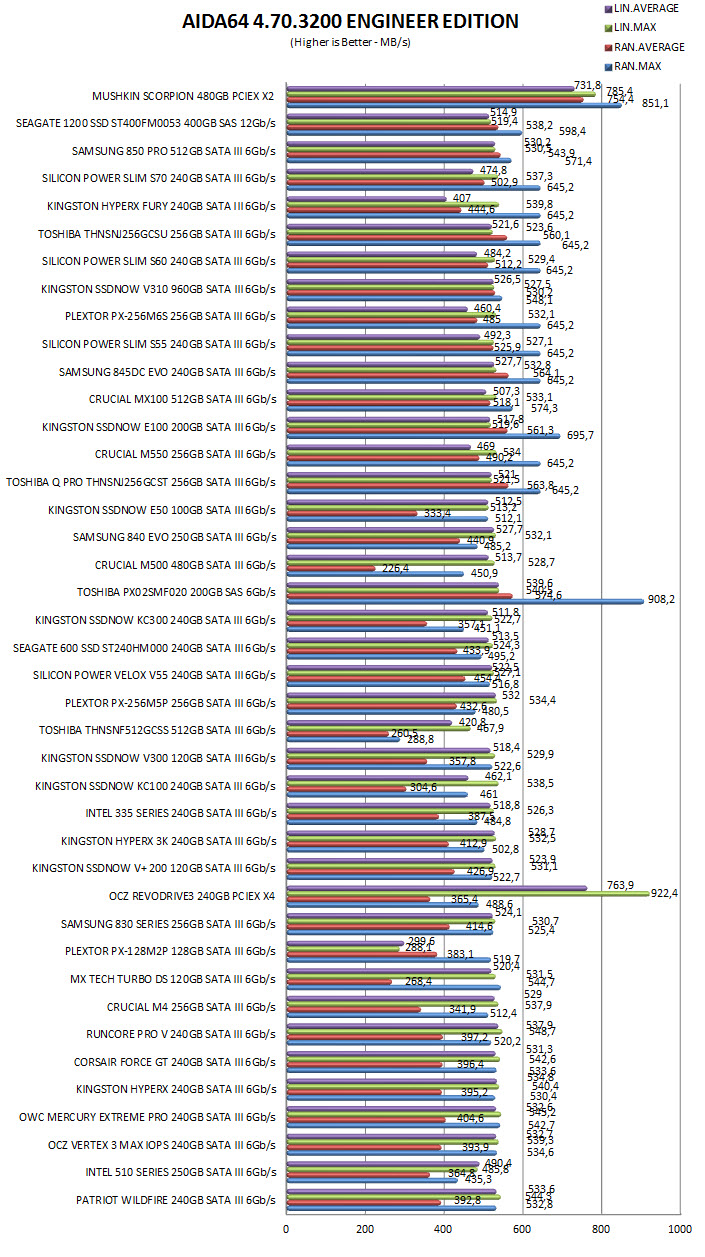

TEST RESULTS - HD TACH RW / HD TUNE PRO


TEST RESULTS - SISOFTWARE SANDRA PRO / CRYSTAL DISK MARK X64


TEST RESULTS – AS SSD / IOMETER
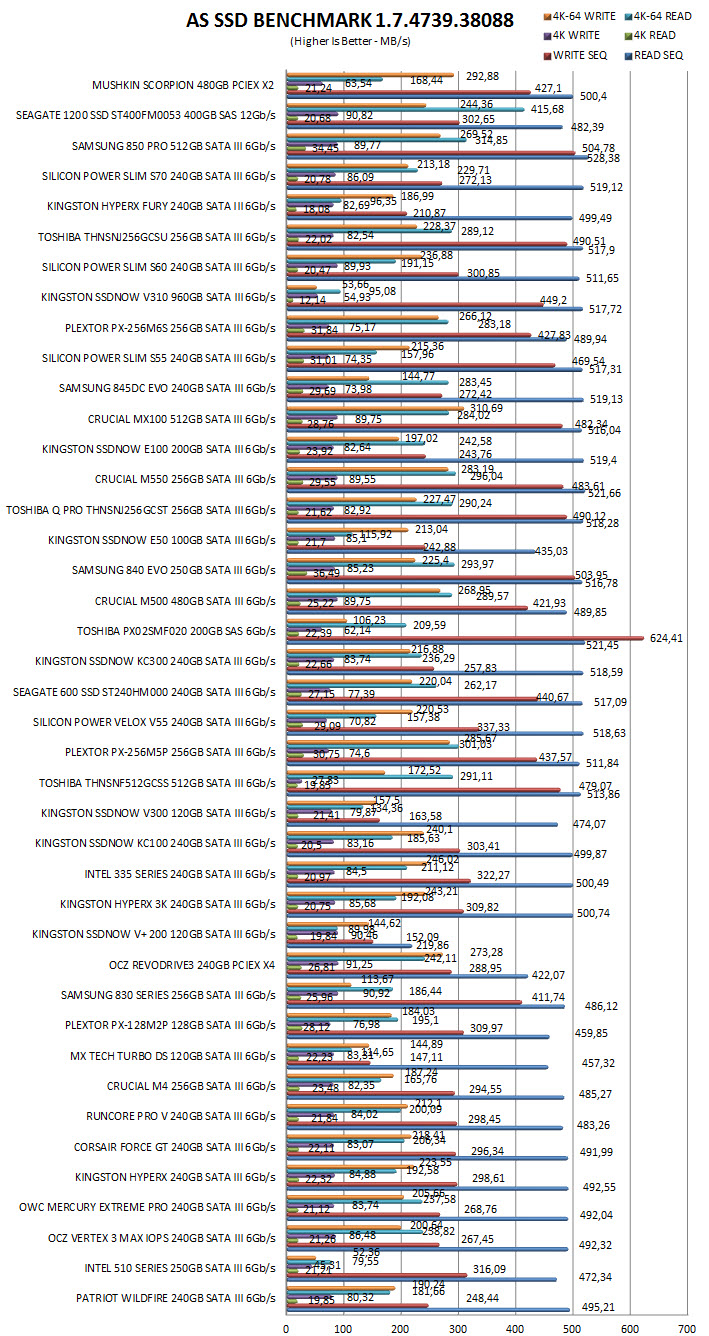
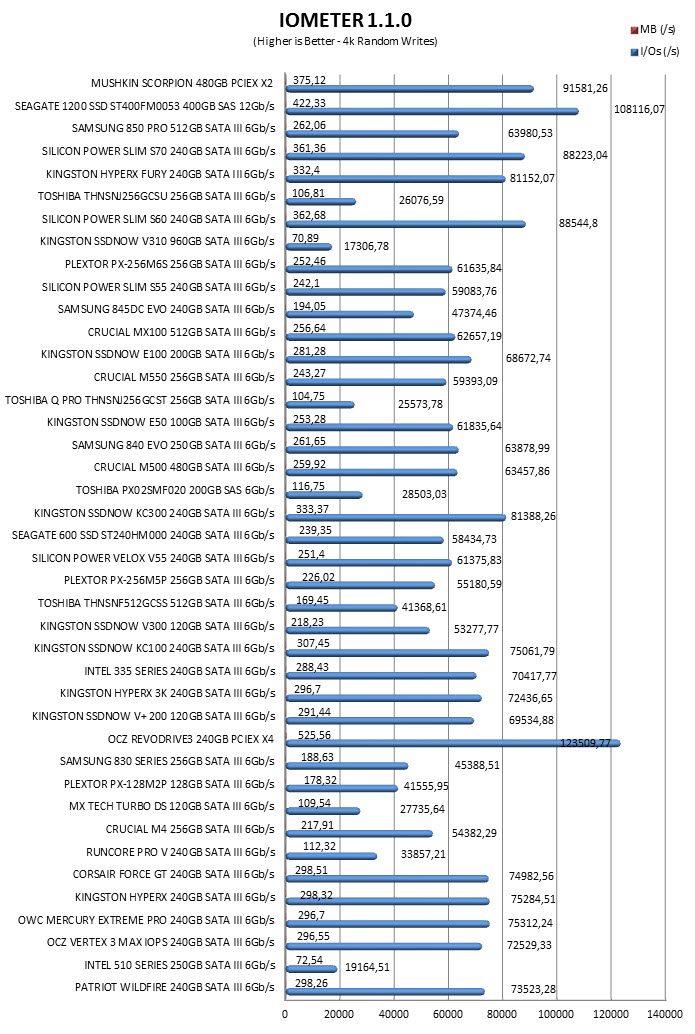
CONCLUSION

The Scorpion 480GB PCIe x2 SSD is the first of its kind to arrive here in quite some time (we have more incoming so expect more such reviews soon) so when it did the first thing i was set on finding out was whether or not it could outperform our favorite RevoDrive 3 240GB PCIe x4 SSD by OCZ which we've been using for roughly 4 years now. Of course when you compare an PCIe x2 drive with an PCIe x4 one you hardly need to wait for the results to come in so i knew right from the start that it would be a long shot. Surprisingly however although the OCZ RevoDrive 3 240GB PCIe x4 is overall faster it's clear from our charts that the Scorpion 480GB PCie x2 does a great job keeping up with it. With this in mind the new OCZ solutions are obviously even faster (we will try to get at least one of those as well) but Mushkin also offers the Scorpion Deluxe PCIe x4 model which can reach much higher read/write speeds (expect a review of that too).
Most PCIe SSDs cost quite a bit but what would you say if you could get one at roughly the same price tag as a high-end SATA III SSD model? Well the Scorpion currently retails for USD579.95 inside the USA (Amazon.com) and 425.84Euros inside the EU (Amazon.de) so it's roughly 25% more expensive compared to some of the leading 480/512GB SATA III SSD models. True this may seem as too much for some people but considering the extra performance and MTBF offered by the Scorpion i think it is well worth it (and from what i read around so do many movie studios). At the end of the day the Scorpion 480GB PCIe x2 SSD by Mushkin may not be the fastest one of its kind (far from it really) but it offers superior read/write speeds compared to its SATA III cousins without asking for much in return and that's why it gets our Golden Award.
 PROS
PROS
- Build Quality
- Very Good Performance Levels
- AES 128/256 Hardware Encryption
- Supports TRIM & NCQ
- 1 Million Hours MTBF
- Supports RAID 0/1
- PCIe Solution
- Price/Performance Ratio
CONS
- Price (For Some)

 O-Sense
O-Sense




















.png)

